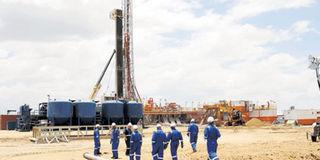What the country can learn from Tanzania

PHOTO | FILE There is a see-saw between mining chamber and government over a proposed law on the sector.
What you need to know:
- In 2010, the government of Tanzania undertook a review of the Mining Act
- Tanzania has also called for the establishment of a mining audit and valuation agency
Tanzania’s minerals account for 5 per cent of the country’s source of wealth. In Kenya, it accounts for only 0.47 per cent of the nation’s gross domestic product (GDP).
But this has not always been the case for the former. In 2010, the government of Tanzania undertook a review of the Mining Act with a view to setting a foundation for the country to reap much more from the sector.
The process involved an increase of royalties paid on the various minerals and a change of the basis used for determination the royalties from the net to gross mineral value.
According to Tanzania’s deputy minister for Energy and Mining, Mr Stephen Masele, the government is targeting to increase the mineral contribution to the GDP to about 10 per cent through undertaking of various measures to promote investment in the sector.
“President Jakaya Kikwete formed a committee to investigate how to improve gains from mining. This culminated in a review of the mining law and royalties. Through this, the government is hoping to raise the level of minerals’ contribution to the economy from the current 5 per cent to about 10 per cent,” Mr Masele told Smart Company on the sidelines of the third edition of the Mining Business and Investment Conference.
The Ministry of Mining is taking a look at the current Mining Act that dates back to 1940 and which has been reviewed just two times.
According to Mr Masele, the process should be inclusive, meaning that the government and industry players should be given an opportunity to express the features they would prefer to see in the new legislative framework.
LEGAL FRAMEWORK
In addition, according to Mr Masele, there is a need to include clauses that will provide a legal framework for the provision of incentives meant to encourage investment in mining.
Such measures, he says, will also see Kenya build its mining sector with a foundation of indigenous small-scale mining companies and reduce over-reliance on multinationals, thus helping to deal with the challenge of capital flight.
“Small-scale mines should be recognised in the policy and the Bill, with provisions to support them in licensing and advancing technology,” he said.
Government recognition of small-scale mining companies also helps entrepreneurs acquire funding from financial institutions to expand their activities.
While reviewing its mining law, Kenya has also been urged to ensure that the new piece of legislation contains clear definitions of how revenue arising from such activities will be shared between the two tiers of government and the local communities living around mining projects.
Tanzania has also called for the establishment of a mining audit and valuation agency to determine the value of mineral exports from Kenya for the purposes of calculating government dues from the sector.





